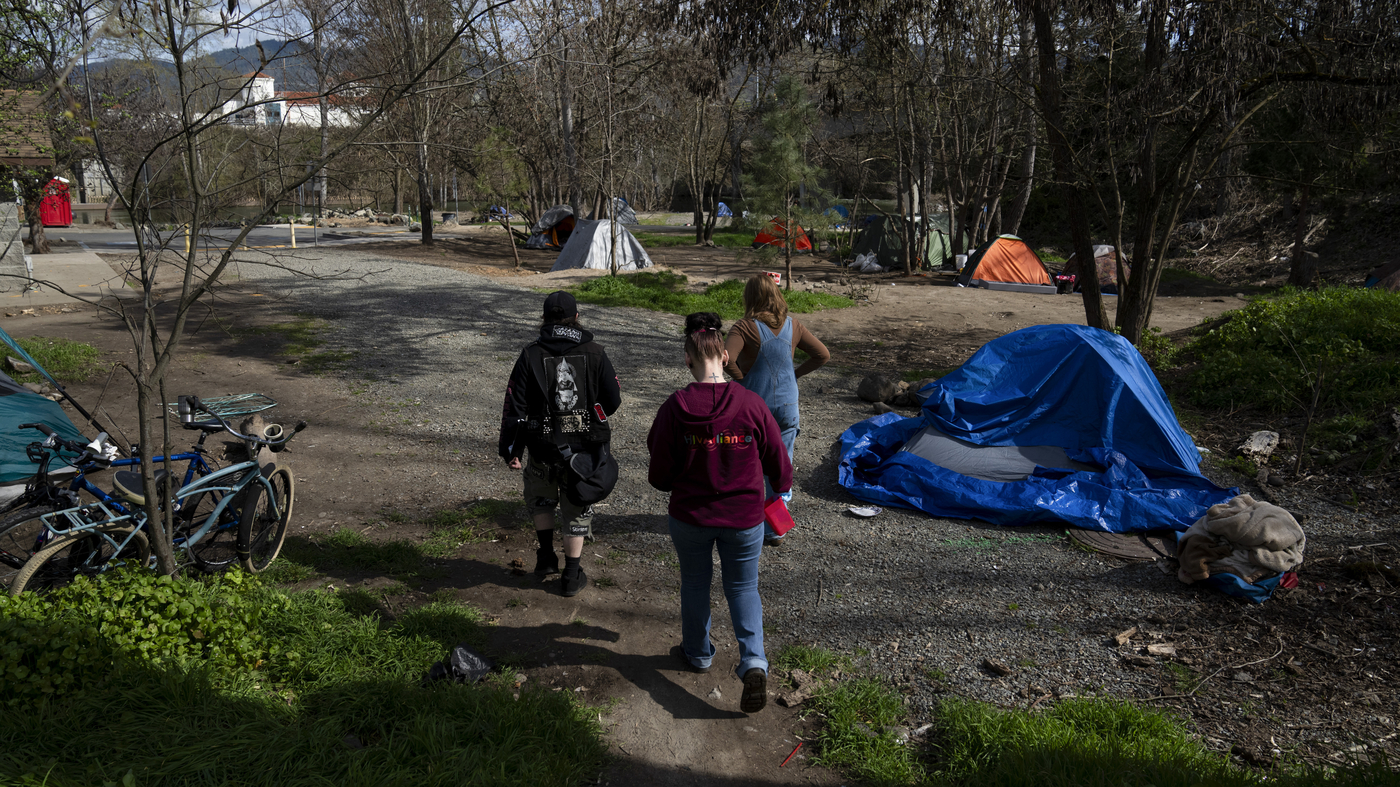![]() It will be legal and encouraged to hunt & kill any unhoused person in at least 13 states by the end of the year at this rate.
It will be legal and encouraged to hunt & kill any unhoused person in at least 13 states by the end of the year at this rate.
In a major case on homelessness, the U.S. Supreme Court on Monday appeared to side with an Oregon city's crackdown on sleeping in public. The decision could have sweeping implications for the record number of people living in tents and cars, and the cities and states struggling to manage them.
The Supreme Court had declined to hear a similar case out of Boise, Idaho, in 2019. But since then rates of homelessness have spiked. An annual federal count found more than 250,000 people living in parks, on streets, and in their vehicles. Sprawling street encampments have grown larger and expanded to new places, igniting intense backlash from residents and businesses.
The current case centers on the small city of Grants Pass, Ore., which has a population just under 40,000 and is a symbol of just how widespread the homelessness problem has become. A slew of other cities and states — led by Democrats and Republicans alike — urged the justices to take up this issue. Cities say the courts have hamstrung efforts to address homelessness
In both the Boise and Grants Pass cases, lower courts said that under the Eighth Amendment it's cruel and unusual to fine or jail someone for sleeping on public land if there's no adequate shelter available. But Grants Pass and many other cities across the West say those rulings have tied their hands as they try to keep their public spaces open and safe for everyone.
Grants Pass has no public shelter. But its local law essentially banned people from sleeping with a blanket or pillow on any public land, at any time.
During Monday's arguments, the Supreme Court's more liberal justices suggested this amounts to unlawfully targeting people simply because they're homeless. "You don't arrest babies who have blankets over them. You don't arrest people who are sleeping on the beach," said Justice Sotomayor.
Justice Kagan said sleeping is not a criminal act. "Sleeping is a biological necessity. It's sort of like breathing. ... But I wouldn't expect you to criminalize breathing in public."
But the court's conservative justices said it can be hard to draw the line between someone's conduct — which can be legally punished — and a status they are unable to change — which cannot be punished. "How about if there are no public bathroom facilities?" Justice Gorsuch asked. "Do people have an Eighth Amendment right to defecate and urinate? Is that conduct or is that status?"
![]()
Over and over, conservative justices also said homelessness is a complex policy problem and questioned whether courts like theirs should "micromanage" it.
"Why would you think that these nine people are the best people to judge and weigh those policy judgments?" Chief Justice Roberts asked.
He doesn't know that I don't think any Supreme Court Justice is the best person to judge or weigh any policy judgements...
Whatever the decision, this case won't solve the homelessness problem
States and cities across the U.S. have struggled to manage record rates of homelessness. Some in the West have found ways to limit encampments and even clear them out without running afoul of the 9th Circuit rulings. Elsewhere, several states have taken a more sweeping approach with camping bans. Florida's governor recently signed a law that seeks to move unhoused people off public property altogether and into government-run encampments.
![]() In America, you are forced to work full-time for poverty wages and when you are made homeless due to an uncontrolled and unregulated housing market, they will send you to live and work in a government camp...
In America, you are forced to work full-time for poverty wages and when you are made homeless due to an uncontrolled and unregulated housing market, they will send you to live and work in a government camp...
Some worry that a decision in favor of Grants Pass will lead to more such moves or even a worst-case scenario of a "banishment race" if communities seek to push people out of their jurisdiction. Justice Sotomayor raised that concern during the arguments.
"Where do we put them if every city, every village, every town lacks compassion?" she said.
Grants Pass and other cities argue that the 9th Circuit's ruling has fueled the expansion of homeless encampments. But whichever way the case is decided, it's not likely to dramatically bring down the enormous number of people living outside in tents and vehicles. Many places simply don't have enough shelter beds for everyone. And more importantly, they don't have nearly enough permanent, affordable housing. The city of Grants Pass is short by 4,000 housing units; nationally, the deficit is in the millions.
If you simply criminalize being unhoused and funnel even more money into the local police department's yearly budget for surplus military gear, you don't have to invest in building 4,000 affordable housing units so long-time members of your community aren't living on public land in tents and you get some free prison slave labor for maintaining public infrastructure ![]()
That shortage has pushed rents to levels many cannot afford, which advocates say is a main driver of rising homelessness. Even where places are investing heavily to create more affordable housing, it will take a while to catch up. This Supreme Court case won't solve any of that, but it could dramatically shape the lives of those forced to live on streets, parks and back alleys for years to come.



If anything, the term sounds vague and ambiguous enough to actually work for propaganda. Like those "temporary housing centers", or however the fuck they renamed cages for migrants under Joe. "Well it's a house and they're given work, sounds like these ungrateful bums should stop complaining!"
deleted by creator